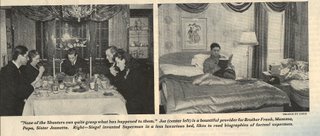
The Curse of Superman?
Believe it or not, some of the TV entertainment shows are bringing up the old chestnut that there is a curse assigned to playing Superman. Kirk Alyn lived to a ripe old age and Bud Collier seemed to do all right himself. I'm sorry about George Reeves and Christopher Reeve and this story belittles their lives.
More much ado about nothing; typical TV.
However there is a great lesson about Superman: creators need to own their creations.
Now I'm entering my close friend Steve Bissette's territory here. He's been talking and writing about this subject for years. Hell, even Mark Martin ( the great comix artist NOT the race car driver) even will write about creator rights. He's another close friend. So I guess I'm caving in to peer pressure!
The photo above is from that June 21, 1941 article on Superman. As you can see, Siegel and Shuster are shown as living now in relative luxury. We all know now that in just a few years they were screwed in ways by DC Comics that affected the rest of their lives.
Max Fleischer did not benefit from his experience with Superman. He didn't own the character. He didn't own his most popular character, Popeye, either. He did eventually own Betty Boop, but only after a court battle and wound up not owning a single one of the films he produced. His heirs, though, have greatly benefited from the court case and have made a ton of dough in merchandising. Too late for Max, though.
The writers of the Mutual radio series, which introduced us to kryptonite and Jimmy Olson and other conventions which the comic adopted, got paid for their efforts and that was that.
Over 60 years later, creators are still fighting this corporate battle and in a way you can't blame the corporations. Corporations that publish or produce want something in exchange for the risk they take. Anticipating a success, they want some sort of long-term participation in the property.
It is always a balancing act between the two parties. Creators must always know what they are willing to give up in order to get their product out to the public.
One of the great "geniuses" in comics (insert sarcastic tone here; in fact probably the only "genius") talked about how the Internet was going to liberate many creative types from corporate bondage by setting up a new economic model. You create something, put it on your web site and people will pay for it. You eliminate the middle man.
Perhaps with music, we've see the beginnings of that kind of commerce. You notice though that most of the attention is generated by big recording companies partnering with other big Internet companies. And that success has come about because of a device that allows you to download the music and carry it everywhere.
Considering that many people don't have high speed connections, downloading a comic book, a novel or a poster is out of the question. Many people would not want to print a 24 page color comic on their home printer.
The web is still years away from being that direct pipeline from creator to consumer when it comes to a viable economic model, despite what "geniuses" say.
Today many creative types can learn a lot from Siegel and Shuster. They can avoid some of the landmines in the creative process that these two stumbled upon. Most importantly, they should learn not to give up on their dreams.
©2006 by Gordon Michael Dobbs. You know the drill.

2 comments:
You dare to question genius. You are truly a super man.
Dobbsy, you are the man. You have brought Mark and I together in intellectual bliss: you are truly a SUPER man.
Post a Comment